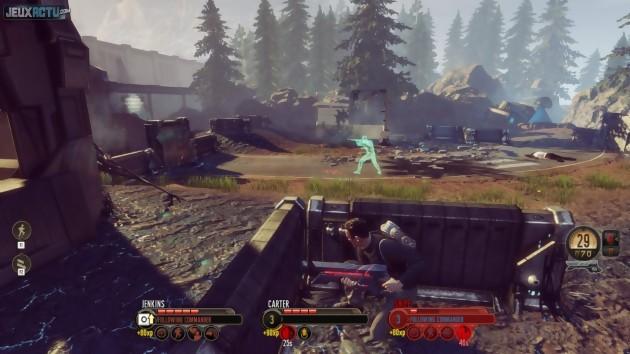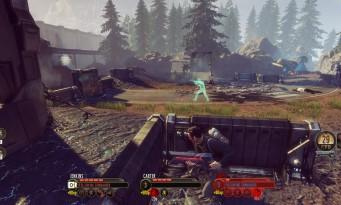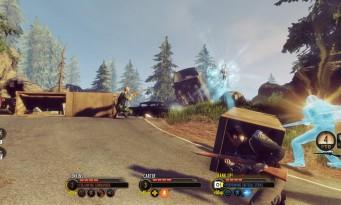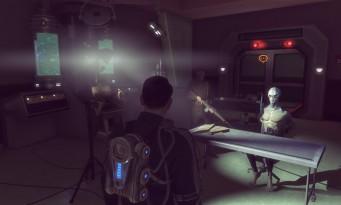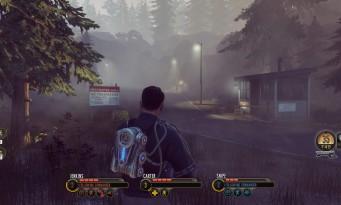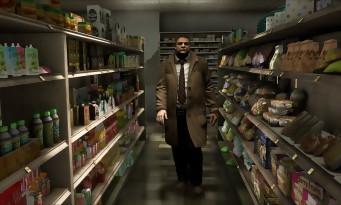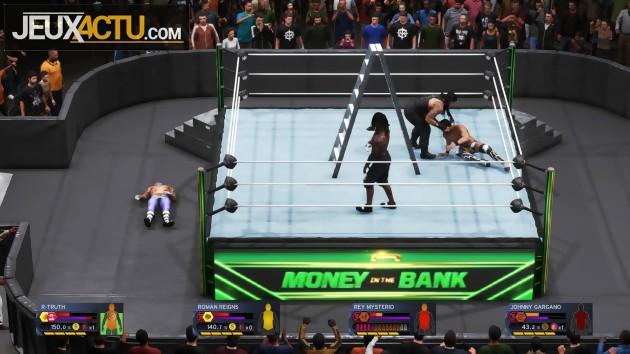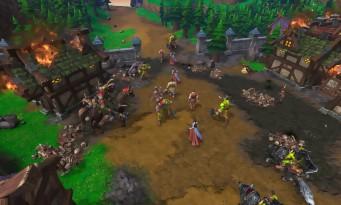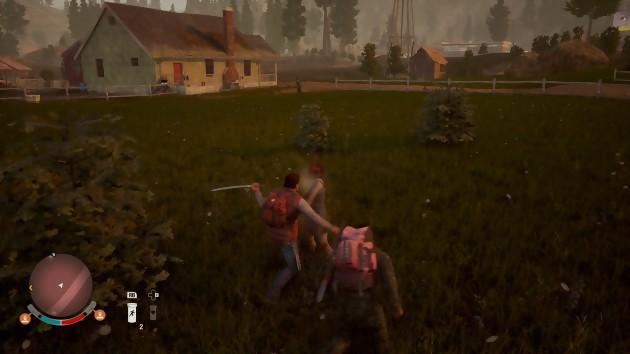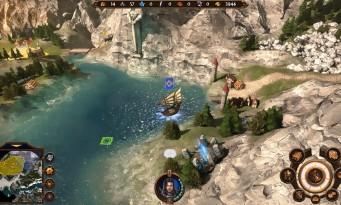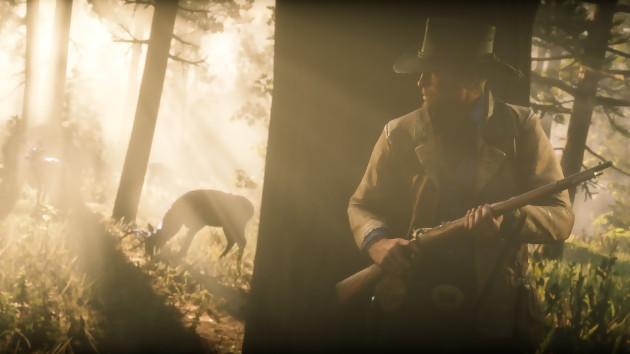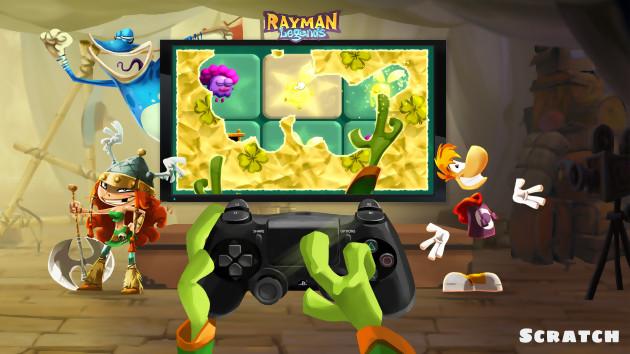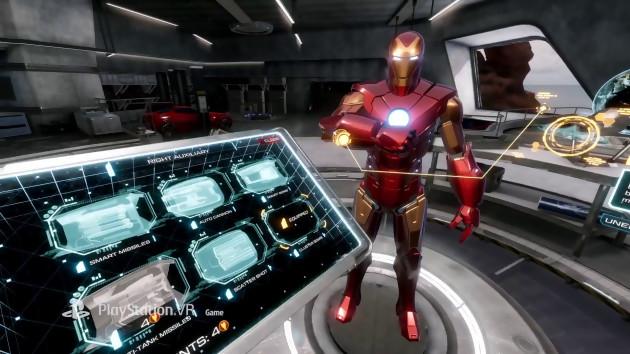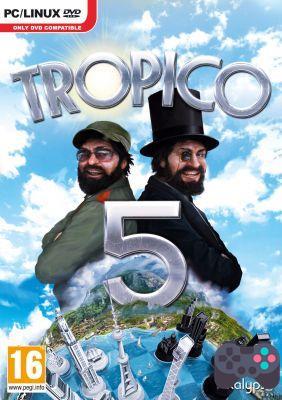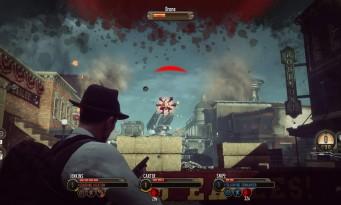 If the theme of the extra-terrestrial invasion is at the heart of the venerable X-COM saga (started in 1994), The Bureau makes us more particularly relive the beginnings of the conflict and the creation of the secret organization responsible for defending our planet. . It all begins on October 28, 1962 for William Carter, an agent responsible for bringing a mysterious briefcase to officials on a war footing. A few adventures later, and our hero is now part of the secret XCOM military base. He can wander around in third-person view and chat with many interlocutors, like a role-playing game. Without always being extremely exciting, the dialogues have the merit of providing us with additional information about the world of the game, and of forcing us to make regular choices. Little by little, it is therefore up to you to take the reins of a rather dry and violent or calm and conciliatory character, which will obviously have some impact on the way the other protagonists will perceive you. Far from being the heart of the gameplay, these dialogue sequences rest the player between each mission and contribute to the strong, pleasant and successful 60's atmosphere. Outfits, sets, situations and even behaviors are period. From anti-communism propaganda posters to generalized sexism, passing through a political context representative of the Cold War, everything is there to take us back a few decades. Even the graphics are adorned with a grainy filter (can be disabled in the options for those who would be irritated) to remind us of the films of yesteryear. The contrast with highly advanced extra-terrestrial technologies (lasers, spaceships, etc.) is all the stronger for this, which ultimately serves the purpose of the clash of civilizations and places humanity in a seemingly hopeless situation. But obviously, the earthlings can count on the warlike and strategic skills of a few special agents to save them.
If the theme of the extra-terrestrial invasion is at the heart of the venerable X-COM saga (started in 1994), The Bureau makes us more particularly relive the beginnings of the conflict and the creation of the secret organization responsible for defending our planet. . It all begins on October 28, 1962 for William Carter, an agent responsible for bringing a mysterious briefcase to officials on a war footing. A few adventures later, and our hero is now part of the secret XCOM military base. He can wander around in third-person view and chat with many interlocutors, like a role-playing game. Without always being extremely exciting, the dialogues have the merit of providing us with additional information about the world of the game, and of forcing us to make regular choices. Little by little, it is therefore up to you to take the reins of a rather dry and violent or calm and conciliatory character, which will obviously have some impact on the way the other protagonists will perceive you. Far from being the heart of the gameplay, these dialogue sequences rest the player between each mission and contribute to the strong, pleasant and successful 60's atmosphere. Outfits, sets, situations and even behaviors are period. From anti-communism propaganda posters to generalized sexism, passing through a political context representative of the Cold War, everything is there to take us back a few decades. Even the graphics are adorned with a grainy filter (can be disabled in the options for those who would be irritated) to remind us of the films of yesteryear. The contrast with highly advanced extra-terrestrial technologies (lasers, spaceships, etc.) is all the stronger for this, which ultimately serves the purpose of the clash of civilizations and places humanity in a seemingly hopeless situation. But obviously, the earthlings can count on the warlike and strategic skills of a few special agents to save them.
X as Xenomorph
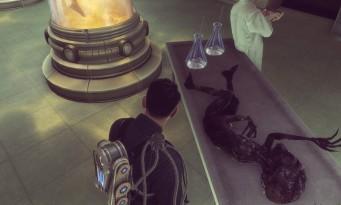 Even if the game was to initially take the form of an FPS, The Bureau never forgets the XCOM heritage. Thus, the fights are adorned with a strong strategic component. And if they ignore the turn-by-turn, they still don't forget to offer an active pause which allows us to give instructions to our teammates. In fact, it is more exactly a strong slowdown in action, during which we can more easily manage the movement of troops and the triggering of their various skills. If the leader William Carter is imposed on him, the player is completely free to choose and customize the other soldiers as he sees fit. Enrollment of different classes, personalization of first and last names, cosmetic choices and selection of talents to be made when leveling up are on the agenda. It is even possible (and advisable) to send the reservists to carry out parallel missions in an autonomous way so that they gain in power. Be careful, however, not to expose your men thoughtlessly, because death is permanent!
Even if the game was to initially take the form of an FPS, The Bureau never forgets the XCOM heritage. Thus, the fights are adorned with a strong strategic component. And if they ignore the turn-by-turn, they still don't forget to offer an active pause which allows us to give instructions to our teammates. In fact, it is more exactly a strong slowdown in action, during which we can more easily manage the movement of troops and the triggering of their various skills. If the leader William Carter is imposed on him, the player is completely free to choose and customize the other soldiers as he sees fit. Enrollment of different classes, personalization of first and last names, cosmetic choices and selection of talents to be made when leveling up are on the agenda. It is even possible (and advisable) to send the reservists to carry out parallel missions in an autonomous way so that they gain in power. Be careful, however, not to expose your men thoughtlessly, because death is permanent!
Even if the game was to initially take the form of an FPS, The Bureau never forgets the XCOM heritage. Thus, the fights are adorned with a strong strategic component.
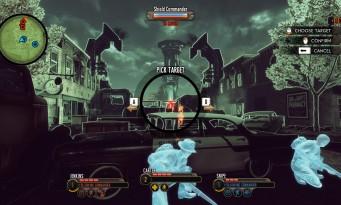 During "really playable" missions, however, it is still possible to load the last checkpoint so as not to lose an agent that is too valuable. In addition, the entire tactical TPS pan of The Bureau is rather well done and effective. The gameplay holds up perfectly, while the skills of the agents are varied enough to establish strategies and achieve devastating combos. An enemy lifted in the air by Carter and suffering a critical hit from a sniper, for example, will have little chance of getting out. Taunt Shout, Holographic Decoy, Auto Turret are some other potentially very useful talents. Alas, this wealth of gameplay is sometimes at the expense of immersion. How to explain that an agent can trigger artillery fire even indoors? Why are we being introduced to agents capable of firing lasers right from the game's intro, when aliens haven't yet been discovered? Small inconsistencies of this type are numerous, some even being due to poor management of scripts.
During "really playable" missions, however, it is still possible to load the last checkpoint so as not to lose an agent that is too valuable. In addition, the entire tactical TPS pan of The Bureau is rather well done and effective. The gameplay holds up perfectly, while the skills of the agents are varied enough to establish strategies and achieve devastating combos. An enemy lifted in the air by Carter and suffering a critical hit from a sniper, for example, will have little chance of getting out. Taunt Shout, Holographic Decoy, Auto Turret are some other potentially very useful talents. Alas, this wealth of gameplay is sometimes at the expense of immersion. How to explain that an agent can trigger artillery fire even indoors? Why are we being introduced to agents capable of firing lasers right from the game's intro, when aliens haven't yet been discovered? Small inconsistencies of this type are numerous, some even being due to poor management of scripts.
So 2010...
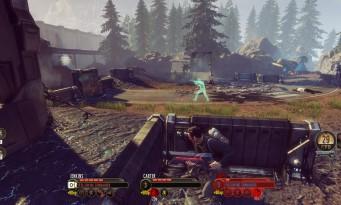 Thus, some dialogues refer to elements... that you haven't necessarily discovered yet (the radio in DaSilva's office). Other times, the monologues are interrupted by the action, as if they were badly (or just "not") timed by the developers. Finally, sometimes it's simply bugs that undermine immersion, such as when we see one of our teammates already inside a room that we have just opened, then that we see it disappear as if by magic before returning to take its place in a natural way. It must be said that technically, The Bureau is not really up to date. The facial animations seem too robotic, for example, especially in VF because they remain synchronized with the English dialogues. The sets seem too static and, in general, the game already shows the weight of the years. It still works, of course, but it will get a lot old in just a few months, when the next-gen will have accustomed players to much more advanced and dynamic graphics.
Thus, some dialogues refer to elements... that you haven't necessarily discovered yet (the radio in DaSilva's office). Other times, the monologues are interrupted by the action, as if they were badly (or just "not") timed by the developers. Finally, sometimes it's simply bugs that undermine immersion, such as when we see one of our teammates already inside a room that we have just opened, then that we see it disappear as if by magic before returning to take its place in a natural way. It must be said that technically, The Bureau is not really up to date. The facial animations seem too robotic, for example, especially in VF because they remain synchronized with the English dialogues. The sets seem too static and, in general, the game already shows the weight of the years. It still works, of course, but it will get a lot old in just a few months, when the next-gen will have accustomed players to much more advanced and dynamic graphics.
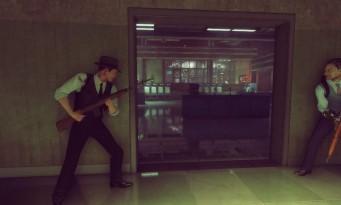 On PC, we are still entitled to a DirectX 11 option supposed to boost the visual quality a little, but the difference with the basic DirectX 9 version is hardly noticeable. Worse: in any case, the game allows itself to row excessively on advanced configurations. It is to be hoped that a patch will quickly resolve this problem because, given what is displayed on the screen, this hardware gluttony is absolutely not justified. We can also point the finger at the automatic backup system. These are far too rare, especially during "adventure" sequences in the military base. As a result, we do not really leave when we want (under penalty of having to start over a large part of the action) but rather when we see that a backup has just been triggered. So it's all the little flaws of this type that taint The Bureau experience. Too bad, because on the merits, the game remains very significant.
On PC, we are still entitled to a DirectX 11 option supposed to boost the visual quality a little, but the difference with the basic DirectX 9 version is hardly noticeable. Worse: in any case, the game allows itself to row excessively on advanced configurations. It is to be hoped that a patch will quickly resolve this problem because, given what is displayed on the screen, this hardware gluttony is absolutely not justified. We can also point the finger at the automatic backup system. These are far too rare, especially during "adventure" sequences in the military base. As a result, we do not really leave when we want (under penalty of having to start over a large part of the action) but rather when we see that a backup has just been triggered. So it's all the little flaws of this type that taint The Bureau experience. Too bad, because on the merits, the game remains very significant.
